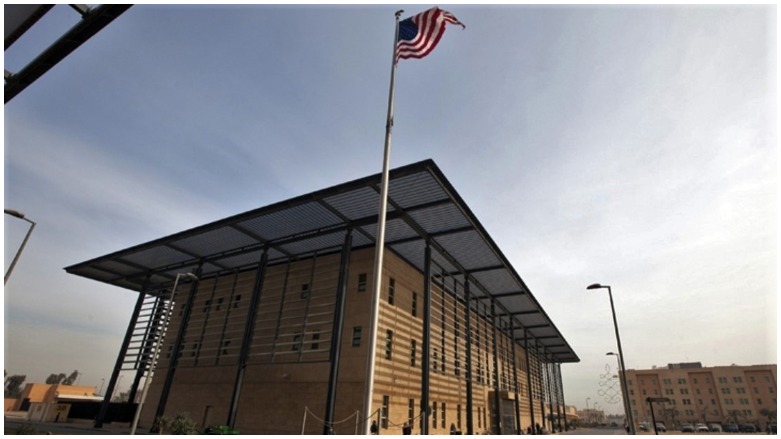Biden signals US commitment to Iraq in talk with Kadhimi

WASHINGTON DC (Kurdistan 24) – In a discussion with Iraqi Prime Minister Mustafa al-Kadhimi on Tuesday, US President Joe Biden expressed his commitment to maintaining and developing ties with Iraq.
In this respect, Biden appears to differ from his two immediate predecessors, Barack Obama who had opposed the US-led war that overthrew Saddam Hussein in 2003, as well as Donald Trump, whose biggest concern was to end the “forever war” that has followed the 9/11 attacks some twenty years ago.
Praise for Kadhimi
In their phone conversation, Biden “commended the Prime Minister’s leadership,” while affirming “US support for Iraq’s sovereignty and independence,” according to a US summary of their discussion.
Biden has had few discussions with any other Middle Eastern leaders, and the statement represented rare praise for an Arab leader. Already, the Biden administration’s renewal of the US commitment to human rights is creating issues in US relations with countries like Saudi Arabia and Egypt.
Rocket Attacks
In Tuesday’s conversation, Biden and Kadhimi also discussed the spate of recent rocket attacks in Iraq—three such assaults since Feb. 15—and “agreed that those responsible for such attacks must be held fully to account.”
Read More: Rocket attack on US embassy in Baghdad
The US has yet to offer even any speculation on which party might have been responsible, repeatedly affirming that it must await the results of the investigations into the attacks.
Journalists have responded with the repeated question: Isn’t it most likely to be Iranian-backed militias? But, yet again, on Tuesday, Pentagon Spokesperson John Kirby reaffirmed that position. “Let’s let the investigations complete,” he said, but “we’re not able to give you a certain attribution at to who was behind the attacks now.”
Rep. Michael McCaul (Texas), the senior Republican on the House Foreign Affairs Committee, in a statement provided to Kurdistan 24 on Tuesday, warned that such a position of studied not-knowing increased the risk of further rocket attacks and ensuing casualties.
Read More: Rep. McCaul calls for quick, decisive action to rocket attacks in Iraq
Maintaining and Expanding US-Iraqi Ties
The US and Iraqi leaders also discussed “the importance of advancing the Strategic Dialogue between our countries, the US read-out said, and—as it notably added—“expanding bilateral cooperation on other key issues.”
The apparent warmth of their conversation was conveyed in the concluding sentence of the US summary, “The President agreed to stay in close touch with the Prime Minister over the coming days and weeks.”
The US-Iraq Strategic Dialogue was begun in the last year of the Trump administration and had, as its objective, to normalize US ties with Iraq—to move beyond a war-time situation and establish the same kind of relationship with Baghdad that Washington has with other Middle Eastern allies.
Read More: The US-Iraq Strategic Dialogue: Good news for the Kurdistan Region
Kadhimi for his part, appeared equally pleased with the discussion and tweeted news about it in Arabic, Kurdish, English, stating that they had “reaffirmed our commitment to bolstering Iraqi-US ties for the benefit of our peoples and cooperation in fighting Daesh,” while the “Strategic Dialogue continues to serve as a roadmap for the future.”
I spoke to @POTUS today.
— Mustafa Al-Kadhimi مصطفى الكاظمي (@MAKadhimi) February 23, 2021
We reaffirmed our commitment to bolstering Iraqi-US ties for the benefit of our peoples and cooperation in fighting Daesh to ensure regional peace and stability.
Strategic Dialogue continues to serve as a roadmap for the future.
Contacts between US and Iraqi Leadership
Biden’s discussion with Kadhimi represented the fifth high-level conversation between Iraqi leaders and the new US administration.
Already on Jan. 29, two days after he was sworn in as America’s new Secretary of State, Antony Blinken spoke with the Iraqi Foreign Minister, Fuad Hussein, while the US ambassador in Iraq met with the senior Kurdish leadership in Erbil.
Read More: US Secretary of State calls Iraqi Foreign Minister, as Ambassador meets senior Kurdish officials
Those were “get-acquainted” conversations, routine as a new US administration assumes office.
The Feb. 15 rocket attack on Erbil precipitated a series of further discussions. Blinken spoke later that same evening with Masrour Barzani, Prime Minister of the Kurdistan Regional Government (KRG), pledging the backing of the US government.
Read More: Sec State Blinken pledges US support on Erbil attack in discussion with PM Barzani
The following day, on Feb. 16, the US Secretary of Defense, Lloyd Austin held phone conversations with Iraq’s Defense Minister, Jumaah Saadoon, and its Minister of Interior Minister, Othman Al-Ghanimi.
Austin offered the two Iraqi ministers support from the Defense Department for the investigation into the rocket attack. However, as Kirby told journalists on Tuesday, “I’m now aware of any [Iraqi] requests for help.”
Editing by John J. Catherine